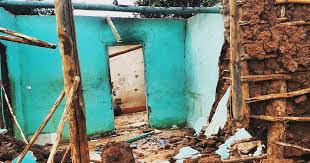COSATU to help evicted Swazi sugar cane farmers

The President of South African trade federation COSATU met with Swazi sugar cane farmers and promised to help them regain control of their land from Swaziland’s absolute monarch King Mswati III.
The Congress of South African Trade Unions (COSATU) President Zingiswa Losi met with sugar cane farmers from Vuvulane, Mafucula and Shewula in Manzini, Swaziland on Tuesday 4 December 2018. She got first-hand information on the on-going evictions and harassment of the farmers by the Royal Swaziland Sugar Company and the Swaziland Sugar Association, both organisations controlled by King Mswati III.
According to Secretary General of the Media Workers Union of Swaziland, Sicelo Vilane, who was at the meeting, the COSATU President promised the farmers that her organisation would meet with the Trade Union Congress of Swaziland to look at how the farmers could be helped.
“She expressed and offered the solidarity of COSATU and the Southern African Trade Union Co-ordination Council to all the communities who are being subjected to such inhuman treatment”, Vilane says.
Democracy or sanctions
In September, Zingiswa Losi became COSATU’s first ever woman president unopposed. She serves on the African National Congress (ANC) national executive committee, but lost out to Jessie Duarte in her bid to become the ANC’s deputy secretary-general last year.
She has advocated for democracy in Swaziland on several occasions as well as calling for economic sanctions against the small landlocked country. In 2012, she told South African newspapers that COSATU “shall be with you [Swaziland] however long it takes, wherever you are and however painful it feels”.
In 2011, Losi was arrested and deported from Swaziland during pro-democracy protests. At the time, COSATU condemned “in the strongest possible terms the brutal crackdown on peaceful protests in Swaziland”.
Given land in 1963

Mpisi Dlamini, a leading member of the Vuvulane Farmers Association, told the COSATU President how he and hundreds of other farmers had been given their land in Vuvulane in 1963 by the Colonial (now Commonwealth) Development Corporation (CDC), says Sicelo Vilane.
“They had produced sugar cane which was milled by the Mhlume Sugar Mill until 1981 when CDC resolved to transfer the land ownership to them. CDC approached [King Mswati III’s father] King Sobhuza II to hand over the title deeds to the farmers, but unfortunately the king passed away before the process was finalised”, according to VIlane.
A few years later, the government had forced the farmers to sign a document that effectively handed over the rights to the land to a company controlled by the royal family. Swaziland’s High Court had ruled in their favour, Dlamini told Losi, but they didn’t get their land back because “the king has taken sides in the matter”.
Losi was also told about forceful evictions and forceful relocations of farmers in Vuvulane, Mafucula and Shewula.
Regular evictions
The Swazi government and Swaziland’s sugar corporations have been harassing, evicting and forcefully relocating sugar cane farmers for many years without compensation to make way for sugar-cane fields controlled by King Mswati.
In 2013 for example, Freedom House reported several “unlawful arrests and detentions carried out by the police” against sugar cane farmers in the Vuvulane area. “Police are increasing pressure on farmers resisting their unlawful evictions from land that they have occupied for generations”, Freedom House stated.
In February 2016, 22 Vuvulane farmers were evicted from lands that they and their families had tended since 1963 by Vuvulane Irrigated Farms and the Swaziland Sugar Corporation.
And an Amnesty International report from September described two cases of forced and unlawful evictions without warning: One in the Malkers, where 60 people were evicted in April, and one in Nokwane, where 180 people were evicted in October 2014.
According to the report, the government “failed to provide essential services to those affected by the forced eviction: food, potable water and sanitation, basic shelter and housing, appropriate clothing or means of livelihood”. The forced evictions were a symptom of “a deeper, underlying problem” that violates international and regional human rights law, Amnesty said.
The more recent evictions have happened amongst other things because the king and his mother wish to use land in Vuvulane to construct a new town, the sugar cane famers say.
“Swazi gold”
Sugar – known in Swaziland as “Swazi gold” - is Swaziland’s main export commodity. With a population of only 1.3 million people, Swaziland is the 4th largest sugar producer in Africa. Sugar production accounts for over half of Swaziland’s agricultural output and nearly one fifth of Swaziland’s gross domestic product.
According to a 2016 report from the International Trade Union Confederation, Mswati uses sugar profits to sweeten his own life, leaving sugar-cane farmers and the majority of the population bitterly impoverished.
And a 2017 report by Danish solidarity organisation Afrika Kontakt revealed how smallholder growers are also left vulnerable by sugar price fluctuations and transport costs, as well as by the corruption and undermining of the fight for democracy, that the European Union-support for Swaziland’s sugar industry, healthcare and education systems allows.
* Peter Kenworthy is a freelance journalist.

Our NGO was also forcefully
Ligação permanente
Our NGO was also forcefully evicted from a building allocated to us by the Vuvulane Farmer's Association in Feb 2106. We provided in-community/mobile access to HIV/AIDS care and treatment to many people in Vuvulane, Mafecula and Shewula. Armed police showed up one day and told our staff to immediately vacate. Obviously with little regard for the effect that would have on the hundreds receiving care and treatment.